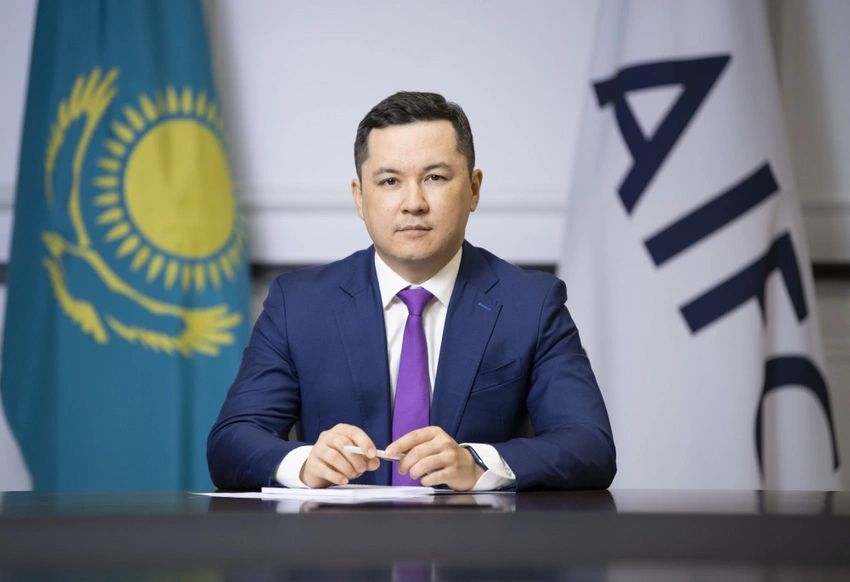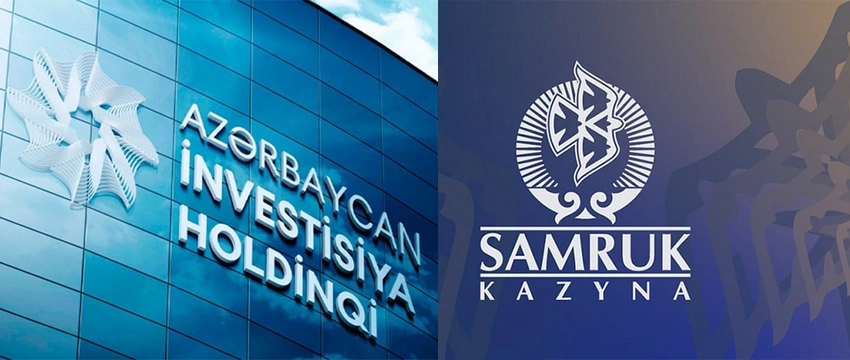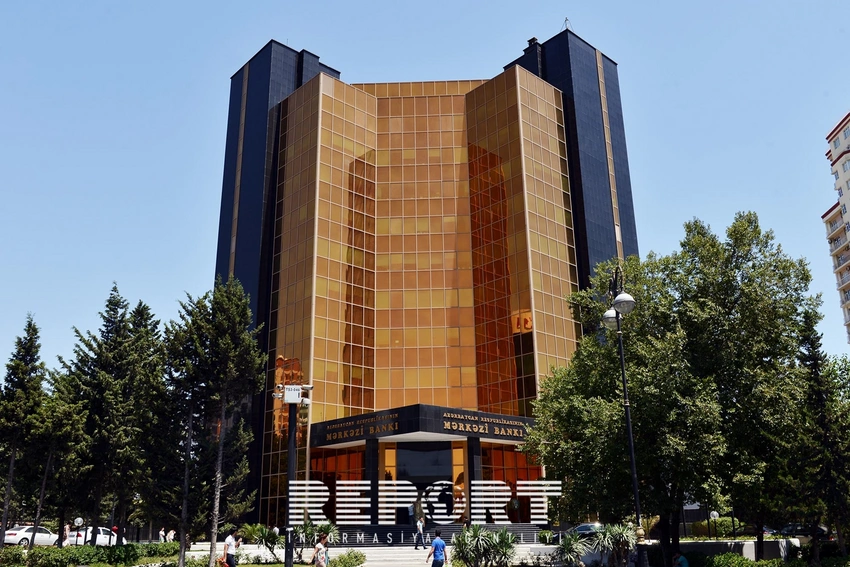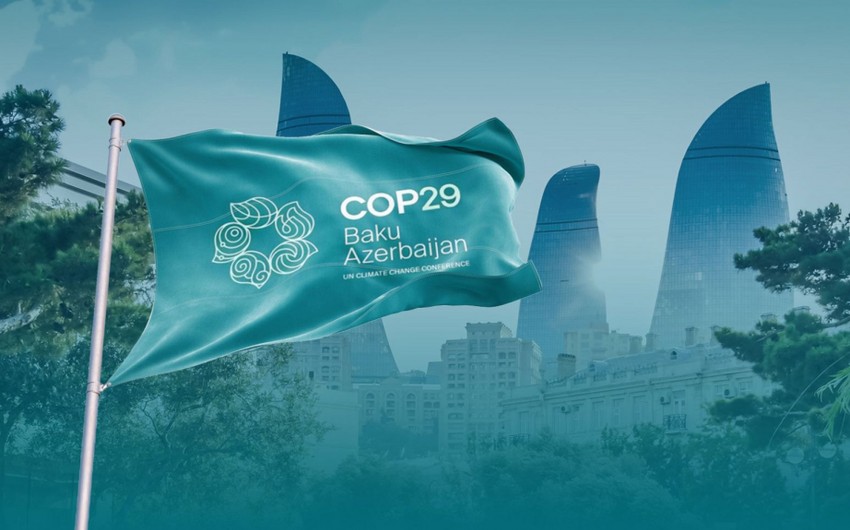AIFC governor: Azerbaijan may become regional leader in green finance - INTERVIEW
- 29 November, 2024
- 12:53

Cooperation between Kazakhstan and Azerbaijan is reaching a new level. The focus is on developing financial markets and investment cooperation.
The Astana International Financial Center (AIFC) is becoming one of the key financial hubs in the Central Asia and Caucasus region, offering unique opportunities for businesses and investors. The use of English law, independent infrastructure, and support for innovative directions such as green and Islamic financing make it attractive for companies from different countries, including Azerbaijan.
In an exclusive interview with Report, AIFC Governor Renat Bekturov shared his views on cooperation prospects with Azerbaijan and explained how AIFC can help Azerbaijani companies enter international markets.
- How do you see AIFC's role in developing financial markets in Central Asia and the Caucasus? What unique advantages does AIFC offer to foreign companies?
- When established, the Astana International Financial Centre was given a simultaneously clear and complex task - to create from scratch an investment-attracting infrastructure in the Central Asia and Caucasus region that would be comfortable for both Kazakhstani and foreign investors. To achieve this, it was decided to form a jurisdiction based on English law principles, as its principles are understood by businesses operating in international markets. Why English law specifically?
Firstly, in the investment world, looking globally, most contracts are concluded in English, and common English law is used in structuring deals. For example, all documentation - from company charters to correspondence - can be done in English without requiring translation to other languages. This accelerates decision-making and document approval processes between transaction parties. Secondly, such law is predictable and stable. AIFC acts contain minimal cross-references to other legal documents, reducing the need to consult other information sources. Thirdly, English law is quite flexible. AIFC law doesn't establish specific requirements regarding contract form, and it allows for contracts with open terms, containing certain agreed conditions while establishing that parties intend to specify details through additional agreements in the future. This condition allows parties to indicate or update certain clarifying provisions at a later stage. A longer statute of limitations of six years compared to Kazakhstan's civil legislation (three years) provides additional protection for ensuring the execution of contracts concluded under AIFC law.

The infrastructure was created on this foundation: an independent court and arbitration center to protect investors' interests, an independent regulator AFSA (Astana Financial Services Authority), the Astana International Exchange for capital market development, green and Islamic financing instruments, digital assets, and much more. Additionally, our regulations allow registration of various forms of business ownership that are not available in jurisdictions like Kazakhstan and Azerbaijan. Tax benefits and simplified labor and visa regimes are also in place through the Expat Center. Thanks to this innovative approach, favorable working conditions were created for AIFC member companies. This laid the foundation for establishing a financial center for the entire region that operates according to high international standards.
This is proven by external assessments: according to the Global Financial Centres Index 36, AIFC ranks first among financial centers in Eastern Europe and Central Asia. In 2022, AIFC regulation was recognized as compliant with the tax transparency standards of the Organization for Economic Cooperation and Development. Specific figures also confirm the financial center's success. Currently, over 3,400 companies from more than 80 countries are registered as participants, including the US, UK, China, Türkiye, Hong Kong, Singapore, Russia, and others. In other words, foreign businesses are interested in coming and working in the financial center, it meets global regulatory standards, and the ecosystem allows for successful and comfortable business operations.
As a result, the volume of attracted investments over the years of operation exceeded $13 billion, of which $5.9 billion were portfolio investments on the AIX exchange and $7.3 billion were investments from member companies. All these unique opportunities are available to businesses and investors from Central Asia and the Caucasus region. Working in AIFC is more convenient than in other international financial centers, even geographically - with a familiar culture and high transport accessibility. They are already taking advantage of these benefits.
Today, more than 180 companies from CIS countries are registered in AIFC, including four companies from Azerbaijan. However, the potential is far from fully utilized: over time, I believe the number of Azerbaijani businesses interested in entering international markets through the AIFC platform will increase.

- How can the AIFC help Azerbaijani banks and financial institutions expand their activities and enter new markets? What tools and services does the AIFC offer for this?
- As mentioned earlier, one of the AIFC's goals is to attract investments and new businesses to operate on our platform, which is why conditions for conducting business are being developed and constantly improved here. The financial center functions as a platform for foreign businesses to come here, register their company or joint ventures with Kazakhstani or other foreign partners, and then operate both in Kazakhstan's economy and at the international level. The necessary tools are already in place: a business-friendly legal environment based on English law, an independent judicial system, flexibility in structuring deals, implementation of new financial instruments, its own stock exchange, and much more. All this applies to financial institutions from Azerbaijan as well. Through the AIFC platform, they can attract investments in capital markets, form new partnerships, and make their own investments in the region and globally. There are already examples of cooperation.
For instance, recently Azerbaijan's Unibank issued the country's debut green bonds worth 20 million manats (about $11.8 million) in accordance with the Green Bond Principles of the International Capital Market Association (ICMA). The green bond issuance was evaluated and approved by the AIFC Green Finance Center, an accredited verifier of the Climate Bonds Initiative (CBI) and the International Capital Market Association. The Centre provided an external assessment in the format of a second-party opinion on the green characteristics of the bonds, giving Unibank an "excellent" rating for its comprehensive environmental strategy and compliance with international green financing standards. In other words, through cooperation with the AIFC, a financial institution from Azerbaijan was able to attract investments according to global standards. Last year, a joint venture "Middle Corridor Multimodal Ltd." was registered at the AIFC together with the national railway companies of Kazakhstan, Azerbaijan, and Georgia to develop multimodal service on the Trans-Caspian International Transport Route (TITR).

There is another good example - the joint "SK-AIH Investment Fund Ltd.", established at the AIFC platform by Kazakhstan's sovereign wealth fund "Samruk-Kazyna" and Azerbaijan Investment Holding. The new structure aims to attract investments in various economic sectors of Kazakhstan and Azerbaijan, including the Trans-Caspian International Transport Route. During the COP29 climate conference, an agreement was signed for the construction of a cargo terminal at the Port of Alat. It will become one of the key links in developing the TITR route, facilitating the growth of container trains on the China-Europe-China route, reducing delivery times and lowering transportation costs and cargo handling time.
This is a positive example showing that Kazakhstan and Azerbaijan are already actively cooperating in practice and jointly engaging in investments, while also demonstrating the advantages of AIFC as a platform for structuring funds and deals. Such examples may increase in the future, considering Azerbaijani colleagues' interest in working at the international level and the potential of Kazakh-Azerbaijani economic relations in general.
- What incentives does AIFC offer to foreign investors, including those from Azerbaijan? Which sectors of Kazakhstan's economy are most attractive for investment?
- The main incentives are a clear legal system, developed financial center infrastructure, and special tax conditions. Such a combination of favorable conditions didn't exist in our region before, which is confirmed by AIFC's leadership among financial centers in Central Asia and Eastern Europe. It's obvious that the potential for attracting Azerbaijani companies to work on the AIFC platform is enormous. For example, over 1,700 companies with Azerbaijani capital operate in Kazakhstan, while only 4 are registered in AIFC. They work in information services and transportation and storage sectors. As Azerbaijani businesses become more aware of the financial center's opportunities and advantages, which we are actively promoting, the number of participants from your country may significantly increase. Regarding sectors, they are well-known. First and foremost are information and communication technologies and everything related to them. Kazakhstan is among the regional leaders in digitalization, but there is still significant room for development in this direction.
Trade, logistics, and resource extraction are also of interest. Kazakhstan has a convenient geographical location on one hand and a rich resource base on the other. Moreover, Kazakhstan and Azerbaijan already have experience cooperating in logistics. Both countries are rich in energy resources and can expand cooperation in energy projects, including infrastructure development such as pipelines and transport networks. Azerbaijan's experience in oil transportation through the Baku-Tbilisi-Ceyhan pipeline can serve as a model for joint ventures or expansion of oil export routes from Kazakhstan.
In terms of transport and logistics, Kazakhstan and Azerbaijan play a strategic role in connecting Asia and Europe, as the so-called Middle Corridor passes through them. Cooperation between the two countries in developing railways, ports, and simplifying customs procedures can increase trade efficiency across Eurasia. AIFC, for its part, offers a convenient platform for attracting investments and structuring deals in all mentioned sectors - from digitalization and finance to the real economy sector.

- What joint projects with Azerbaijan could be most promising for AIFC development? For example, in Islamic finance, green economy, or digital finance?
- Thanks to AIFC's establishment and development, Kazakhstan is actively developing its financial sector. Azerbaijan can take advantage of these opportunities through cross-border investments, green finance, fintech, and Islamic finance. Green financing looks promising as a tool for ensuring sustainable growth. AIFC offers a reliable base for issuing "green bonds," financing renewable energy projects, and environmentally friendly projects. Both Kazakhstan and Azerbaijan can use this opportunity to attract international investors focused on sustainable development investments. This can also help Azerbaijan reduce its dependence on carbon-intensive industries while complying with global environmental standards and enhancing its reputation as a regional leader in green financing. Similarly, there's potential in the Islamic finance sector. According to the Eurasian Development Bank, in 2023, the global Islamic finance market reached $4.5 trillion, doubling in seven years. By 2027, this amount could reach $6.7 trillion. This is a truly large market that hasn't yet been sufficiently developed in the post-Soviet space.
At AIFC, developing this market is a priority, with appropriate legal framework established for issuing Islamic bonds (sukuk), Islamic banks, insurance organizations, and other market participants. There's demand for such products among citizens of our countries, making it promising for Azerbaijan's financial sector. AIFC can offer a convenient platform for Islamic finance operations.
- What infrastructure has been created at AIFC to support foreign companies? What additional measures are planned to improve the infrastructure?
- All necessary infrastructure is already operating, allowing foreign businesses to work in AIFC. This includes a whole ecosystem, from the Expat Center with simplified labor and visa regimes and company registration to redomiciliation and securities listing possibilities. We're currently focused on improving existing business processes and implementing new financial instruments for business use. For example, AIFC recently adopted rules for "family offices," allowing the creation of family funds for wealth management, and an Intellectual Property Act ensuring copyright protection according to international standards. These are just two examples of what's being implemented in the financial center. This work continues constantly to offer businesses and investors maximum development opportunities.
- What are the main challenges facing AIFC in developing cooperation with Azerbaijan and other countries in the region?
- It's important to work on raising business awareness about AIFC's opportunities. Companies from Azerbaijan and other Central Asian and Caucasus countries, when entering the international level, can use our platform for easier access to global financial markets, all within transport accessibility. Azerbaijan's market has great development potential, so we expect even more participants from there and more new partnerships that could strengthen the economies of Kazakhstan and Azerbaijan.

- In September of this year, a memorandum of intent was signed between the Central Bank of Azerbaijan and the AIFC. What specific areas of cooperation were defined in the memorandum? What concrete steps will be taken to develop financial markets within the cooperation framework outlined in the memorandum? How possible is the creation of joint financial instruments or platforms?
- Indeed, on September 23, the Central Bank of Azerbaijan and the AIFC Financial Services Regulatory Committee signed a memorandum of understanding. Its purpose is to help establish a legal framework for cooperation between the two institutions, strengthen their relationships, and promote the safe operation of financial markets. The memorandum also allows for the exchange of experience and information and the organization of mutual visits. This can be considered the first stage in cooperation with our Azerbaijani colleagues. We pursue similar goals - developing sustainable financial markets that support stable economic growth. Both sides aim to exchange experience and join efforts to achieve this goal, contributing to the development of Kazakhstan and Azerbaijan.
AIFC is actively developing cooperation with Azerbaijani colleagues overall. For example, in October, a memorandum of understanding was signed with ADA University's Institute of Development and Diplomacy. The parties will direct joint efforts toward developing new approaches in research, analytics, and "green financing" in the region. In particular, the parties agreed to exchange information and expertise in these areas. All this helps to more effectively address issues and achieve goals set by all parties to the agreements.
- What new areas of cooperation might be considered in the future?
- Currently, we should focus on deepening cooperation in those sectors where Azerbaijan and Kazakhstan have already begun joint work. One of these areas is sustainable development and ESG. This is especially important in light of the recent UN Climate Change Conference COP29 in Baku. Azerbaijan pays great attention to developing green finance, as evidenced by Unibank's recent debut green bonds placement.

For the development of this cooperation, there is now another platform - the Turkic Council on Green Finance, the memorandum on the establishment of which was signed during the 11th summit of the Organization of Turkic States by Kazakhstan, Azerbaijan, Kyrgyzstan, Turkey, and Uzbekistan. Among the council's tasks are the development and promotion of the green and sustainable financing market in OTS countries and increasing the flow of ESG investments into environmentally friendly projects. The secretariat of the new body will be located at the AIFC, and its functions will include assisting the council in organizing its activities and developing key documents. Also, as part of COP29, a Declaration on establishing a partnership of OTS countries in climate, innovation, green economy, and trade was signed, which will continue and strengthen the activities of the council on green finance.
Similarly, cooperation using the AIFC platform capabilities can be continued in other sectors - from finance and logistics to industry, as a convenient legal framework for conducting business and concluding deals has been formed here.
